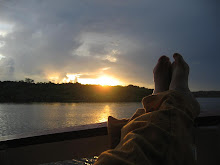 I have been a fan of fermentation every since tasting my first beer at what was certainly an inappropriate age. What really got me going however, was the time I spent in Belgium after graduating high school. The beers I experienced there (yes, I said experienced) were like nothing I ever tasted before -- truly wholesome brews crafted over long periods of time and filled with healthful, beneficial microbes (in addition to plain old deliciousness). I knew then that I would forever be a fan of the fermented beverage. What I didn't know is just how far down the rabbit hole this newfound love of fermentation would take me.
I have been a fan of fermentation every since tasting my first beer at what was certainly an inappropriate age. What really got me going however, was the time I spent in Belgium after graduating high school. The beers I experienced there (yes, I said experienced) were like nothing I ever tasted before -- truly wholesome brews crafted over long periods of time and filled with healthful, beneficial microbes (in addition to plain old deliciousness). I knew then that I would forever be a fan of the fermented beverage. What I didn't know is just how far down the rabbit hole this newfound love of fermentation would take me.Later on in that same trip, I experienced real German sauerkraut. Growing up, I had always been a fan of sauerkraut (Rubens are without question my favorite sandwich). What I was unaware of however was that the sauerkraut in these sandwiches was dead -- all the healthful organisms in it were killed by pasteurization before this corporate product was shipped all over the country. Not in Germany. I still remember sitting down at my first pub there and ordering a bratwurst with sauerkraut (sauerkraut which, unbeknownst to me, was actually fermented in the back of the pub). I couldn't believe my taste buds! This sauerkraut was to the sauerkraut I loved at home what a grilled ground sirloin burger is to a happy meal. Unbelievable!
That's it - I was hooked. I still didn't trust myself to mess around with my own ferments, but as soon as I got home I sought out micro brews and home fermented krauts and yogurts wherever I could. I even had a short love affair with a Mr Beer home brew kit while in college (the kind you buy from SkyMall magazine and where you never have to deal with truly raw ingredients). My roommate and I turned out a couple good beers to be sure, but we weren't quite craft ready. So when I graduated and moved to San Francisco, I decided it was finally time. I bought myself a copy of Wild Fermentation and got brewing:
 When I first started reading this book, I was amazed at how many times I stopped and just stared off into the distance, imagining all the things I was going to ferment when I was done reading. There is almost not a page of this book that I haven't marked with a post-it or a dog ear. The author provides great insight based on both science and on his own experience, and his excitement is literally contagious. He loves fermented foods, and by the time you finish reading his book, I guarantee you will too.
When I first started reading this book, I was amazed at how many times I stopped and just stared off into the distance, imagining all the things I was going to ferment when I was done reading. There is almost not a page of this book that I haven't marked with a post-it or a dog ear. The author provides great insight based on both science and on his own experience, and his excitement is literally contagious. He loves fermented foods, and by the time you finish reading his book, I guarantee you will too.Since buying this book, I have made my own saurkraut (several different variations), kimchi, and dill pickles. I am working on my first batch of Kombucha right now. The beer is on hold until I can find space in my apartment to set up a simple brew station, but I feel more comfortable going into it than I ever could have without this book.
Wild Fermentions is very informative, with great recipes and very easy to follow step by step instructions. If I had to point to any negatives in the book, it would be a little too much information about the author himself and his communal living situation (not that I mind the author's hippy dippy ways, it's just that the many exploits of his house mates with single, nature-based names are besides the point).
I would recommend this book to anyone who is interested in fermented foods, and even to people who aren't. There is some form of ferment in this book for just about anyone.
Proust!
Image provided by Wild Fermentation




No comments:
Post a Comment